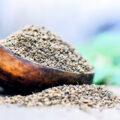The word Triphala is made from two words- tri + phala- which means three fruits. It is named so because the herbal mixture is made of three dried fruits native to India namely-Indian gooseberry (Emblica Officinalis), black myrobalan (Terminalia chebula), and Haritaki (Terminalia chebula).
Triphala is considered a polyherbal medicine, meaning it consists of several different medicinal herbs. In Ayurvedic medicines, polyherbal formulations are popular because it is believed that combining synergistic herbs results in increased therapeutic effects and benefits.
Benefits of Triphala
- Anti-Inflammatory Properties
- May Protect Against Certain Cancers
- May Protect Against Dental Disease and Cavities
- May Aid Weight Loss
- Can Be Used as a Natural Laxative
It is believed to have several health benefits, including:
- Digestive health: Triphala is commonly used to support digestive health and promote regular bowel movements. It is believed to help regulate digestion, improve gut health, and relieve constipation.
- Antioxidant properties: Triphala contains high levels of antioxidants, which can help protect the body from oxidative stress and damage caused by free radicals. This may help reduce the risk of chronic diseases such as cancer, heart disease, and diabetes.
- Immune system support: Triphala has been shown to have immune-boosting properties, which may help protect against infections and illness.
- Skin health: Triphala has been used traditionally for improving skin health, as it is believed to help prevent acne and other skin conditions by detoxifying the body and reducing inflammation.
- Eye health: Triphala has been shown to improve eye health and vision, as it contains high levels of vitamin C and other antioxidants that can help protect the eyes from damage.
Potential Side Effects
While Triphala is generally considered safe and has potential health benefits, it may cause side effects in some people.
For example, due to its natural laxative effects, it may cause diarrhea and abdominal discomfort, especially in high doses. Triphala is not recommended for pregnant or lactating women and should not be administered to children. There are no scientific studies on the use of Triphala in these populations, and its safety can’t be guaranteed.
Triphala may cause diarrhea and intestinal discomfort in some people and can react with certain medications. Children, pregnant and lactating women and those with bleeding disorders should avoid it.




